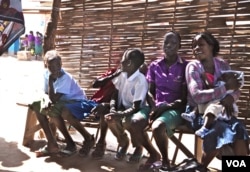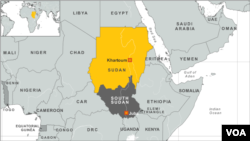JUBA , SOUTH SUDAN —
In war-ravaged South Sudan, a lack of basic health and education, early marriage, and a culture that values big families have led to alarming child mortality rates, and given the poverty-stricken nation the highest maternal mortality rate in the world. But as aid agencies move in to provide basic healthcare, South Sudanese women are getting the chance to improve their chances for a long life.
At a health clinic on the outskirts of Juba, women dangling babies on their laps and shushing others listen with rapt attention to a health worker explaining various methods of birth control.
Guilty giggles and glances fill the room during the question and answer session about a new miracle in South Sudan - where the average woman has seven children and the mothers have the highest mortality rate in the world.
Cut off for almost 50 years by Africa’s longest running civil war, newly-independent South Sudan has been building a health service from scratch with the help of international aid agencies.
But studies show that at 1.7 percent, South Sudan has one of the lowest contraceptive availability rates in the world, and that early pregnancy has increased from one-fifth to one-third of teenagers in recent years.
A mother of three, Jennifer Yeno, said she had her first child at age 15. Now just 21 years old, she explained through a translator why she is getting a hormone implant that will give her a five-year break.
“She doesn’t want that quick production - it’s not all that good. We need to have the gaps to have that happy family. People who reproduce with the gaps - they are happy. The idea was because of this young baby you can see here - the five years will lapse when it is OK to have another baby.”
And it's not just young girls in South Sudan who are struggling to cope with large families that they have no control in limiting.
Mother of five Tabita Nadia said that at 35, her husband has got a new wife who has her own children and is pregnant with another.
She said the paltry and irregular salary of her soldier husband already makes it difficult to support her own children, who she is determined to educate in a hope that one may someday lift the family out of poverty.
"It’s only that money that army men get, and it does not come regularly. It comes sometimes. And if there is no money, she goes cracking stones in order to survive, and after cracking, she goes and pays school fees for the children.”
If Nadia works from sunup to sundown doing backbreaking work that she said makes her very sick in the chest, she can earn $100 a month.
South Sudan hopes to increase the contraceptive availability rate to 20 percent by 2015, as the new nation’s population grows at three percent a year and it struggles to get a grip on providing basic services.
Family planning charity Marie Stopes International (MSI) started programs in South Sudan’s three southern states, and hopes to expand to more conservative areas in time.
But as women wait patiently in the scorching sun at Gurei clinic for MSI clinical officer Jude Omal, he said it has been a tough year explaining to fellow countrymen that birth control is beneficial.
“When we were beginning, we had a lot of resistance as people think when you provide family planning to a mother, or a lady of reproductive age, she may most likely turn into a prostitute. You say ‘no, these services helps her to have children at a time when she thinks she’s ready,' so this family planning is like an empowerment to women and girls of reproductive age.”
But he said both men and women are increasingly aware about the links between a quick succession of pregnancies and lack of health care to high instances of maternal mortality.
He is hopeful that for the beleaguered women of South Sudan, where over 80 percent are deprived of an education and 16 percent married off by the age of 15, a choice will come.
At a health clinic on the outskirts of Juba, women dangling babies on their laps and shushing others listen with rapt attention to a health worker explaining various methods of birth control.
Guilty giggles and glances fill the room during the question and answer session about a new miracle in South Sudan - where the average woman has seven children and the mothers have the highest mortality rate in the world.
Cut off for almost 50 years by Africa’s longest running civil war, newly-independent South Sudan has been building a health service from scratch with the help of international aid agencies.
But studies show that at 1.7 percent, South Sudan has one of the lowest contraceptive availability rates in the world, and that early pregnancy has increased from one-fifth to one-third of teenagers in recent years.
A mother of three, Jennifer Yeno, said she had her first child at age 15. Now just 21 years old, she explained through a translator why she is getting a hormone implant that will give her a five-year break.
“She doesn’t want that quick production - it’s not all that good. We need to have the gaps to have that happy family. People who reproduce with the gaps - they are happy. The idea was because of this young baby you can see here - the five years will lapse when it is OK to have another baby.”
And it's not just young girls in South Sudan who are struggling to cope with large families that they have no control in limiting.
Mother of five Tabita Nadia said that at 35, her husband has got a new wife who has her own children and is pregnant with another.
She said the paltry and irregular salary of her soldier husband already makes it difficult to support her own children, who she is determined to educate in a hope that one may someday lift the family out of poverty.
"It’s only that money that army men get, and it does not come regularly. It comes sometimes. And if there is no money, she goes cracking stones in order to survive, and after cracking, she goes and pays school fees for the children.”
If Nadia works from sunup to sundown doing backbreaking work that she said makes her very sick in the chest, she can earn $100 a month.
South Sudan hopes to increase the contraceptive availability rate to 20 percent by 2015, as the new nation’s population grows at three percent a year and it struggles to get a grip on providing basic services.
Family planning charity Marie Stopes International (MSI) started programs in South Sudan’s three southern states, and hopes to expand to more conservative areas in time.
But as women wait patiently in the scorching sun at Gurei clinic for MSI clinical officer Jude Omal, he said it has been a tough year explaining to fellow countrymen that birth control is beneficial.
“When we were beginning, we had a lot of resistance as people think when you provide family planning to a mother, or a lady of reproductive age, she may most likely turn into a prostitute. You say ‘no, these services helps her to have children at a time when she thinks she’s ready,' so this family planning is like an empowerment to women and girls of reproductive age.”
But he said both men and women are increasingly aware about the links between a quick succession of pregnancies and lack of health care to high instances of maternal mortality.
He is hopeful that for the beleaguered women of South Sudan, where over 80 percent are deprived of an education and 16 percent married off by the age of 15, a choice will come.





